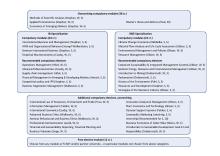Method of teaching
Classes are very small, typically around 15-25 students, which allows intense exchange between teachers and students.
Students participate actively in the educational process not only by preparing presentations, small paper submissions, and even academic papers, but also by engaging actively in vital scientific discussions in tutorials and seminars.
e-learning is used to complement the usual teaching in person in class room. Attendance in lectures and living in the region of Freiberg is hence still necessary. The contents offered in e-learning are increasing constantly.
Structure of the programme

Students study according to an indicative study plan, which offers ample possibilities to align to individual interests and to their own job experiences. Additionally, students can choose from a large variety of additional, non-compulsory lectures on a voluntary basis to extend their knowledge and skills.
Compulsory courses are mainly allocated to the first two semesters, they lay the foundations for the following core electives. The Master's thesis complements and concludes the studies in the fourth semester. Free electives can be taken at any time during the four semesters.
The programme offers some possibilities to spend a semester in a partner university, so as to broaden the scientific background and earning experience even further. In the specialisation of International Business (IB), such a semester abroad is even stronly recommended, it is also possible in R&E. The programme also offers the possibility to earn credit points in an internship, to broaden the already acquired job experience in new competencies that opened up in the course of studying.
In general, the programme intends to offer the largest possible flexibility to students whilst requiring a core set of learning objectives that offer a sound basis for future personal development in individual careers. The design of the curriculum intends to offer a well-balanced mixture of subjects in the areas of International Business and Management of International Businesses; Economics & Law; Business Administration; Economic Globalisation; and Economic Development.